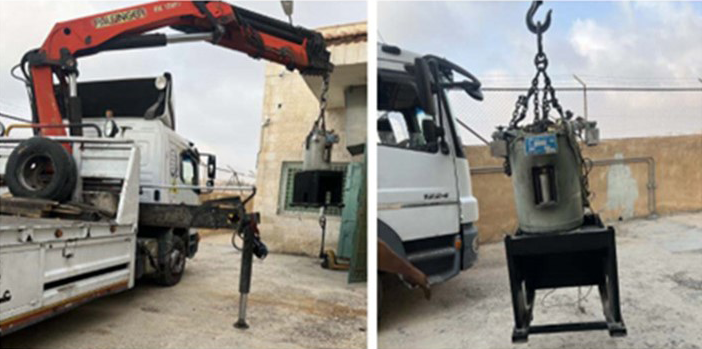Team Supports Nuclear Nonproliferation in Jordan

Congratulations to the Pacific Northwest National Laboratory team that completed the replacement of Jordan’s four high-activity blood irradiators. From the top row, left-to-right: Bryan Avery, Chris Caicedo, Jennifer Elster, Justin Engel, Shannon Goodwin, and Joel Koppenaal.
(Composite image by Shannon Colson | Pacific Northwest National Laboratory)
Congratulations to a Pacific Northwest National Laboratory (PNNL) team that recently supported the National Nuclear Security Administration (NNSA) and the U.S. Nuclear Security Strategy to lock down nuclear and radiological materials and prevent terrorist acquisition. Joel Koppenaal, Justin Engel, Bryan Avery, Chris Caicedo, Jennifer Elster, and Shannon Goodwin worked on the NNSA Office of Radiological Security (ORS) program to replace all of Jordan’s high-activity cesium-137 irradiators with X-ray technology (see NNSA article).

At PNNL, a total of eight teams work on the ORS program to reduce the reliance on high-activity radioactive sources through the promotion of viable nonradioisotopic alternative technologies domestically and internationally. Last fiscal year, these teams engaged sites in 28 countries to implement projects to replace radioisotopic devices with alternative technology and remove radioactive sources to secure storage. The teams also conducted several outreach efforts in many different forums.
“Since the program began, PNNL’s teams have eliminated 300 high-activity irradiators domestically and 40 high-activity irradiators internationally. These accomplishments help NNSA meet its Mission Priority to provide solutions that enable global security and stability,” said Mike Hazel, ORS program manager.
The project to replace Jordan’s four high-activity blood irradiators began in 2019. The project that was supposed to complete in two years took longer because of the travel and in-person meeting restrictions in force during the COVID-19 pandemic.
“The Jordanians were committed to the project and when the restrictions were lifted, we began work immediately,” said Joel Koppenaal, project manager. Three sources were replaced at hospitals and one source was replaced at a research facility. Koppenaal also acknowledged the work of the project team of Andrew Knigge, Allison Parnell, and Doug Day, who kicked off the project in 2019.
Published: January 10, 2024